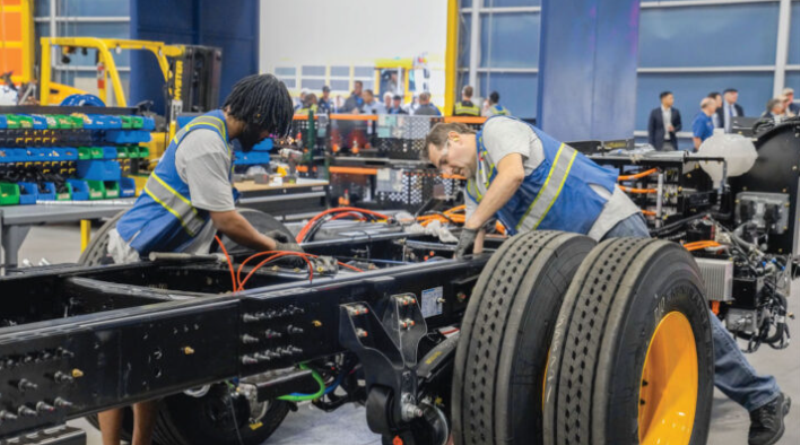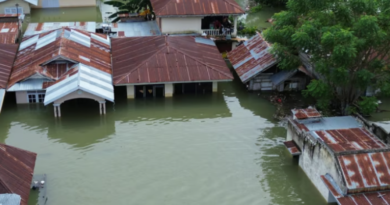Training 1 million new apprentices for Cleantech & climate jobs by 2035
The Governors’ Climate-Ready Workforce Initiative was launched this week by the U.S. Climate Alliance, a bipartisan coalition of 24 governors who together account for roughly 60% of the country’s economy and 55% of its population. The initiative aims to increase career pathways in the clean energy and climate fields, enhance workforce diversity, and collaboratively train one million new registered apprentices by 2035 throughout the states and territories of the Alliance.
The Inflation Reduction Act and the Infrastructure Investment and Jobs Act of the Biden-Harris administration are expected to create millions more well-paying union jobs in climate-ready fields in the years to come. This is in addition to the historic federal investments and aggressive state climate action that have already resulted in a significant expansion of these jobs. High-quality jobs in the domains of climate resilience and natural climate solutions are included, in addition to those in the clean energy and clean technology sectors, which include wind, solar, electric cars, energy efficiency, and batteries.
By 2035, Alliance states and territories will work together to support one million new workers as they complete Registered Apprenticeship programs throughout the partnership. Registered with the U.S. Department of Labor or federally approved State Apprenticeship Agencies, these programs offer a particularly beneficial and well-proven career track that enables workers to gain experience while earning a living in critical industries and occupations that are responding to and trying to prevent climate change.
“The Initiative’s launch comes as historic federal investments, combined with ambitious state climate action, have unleashed a significant expansion of good-paying and union jobs in climate-ready fields — with millions more anticipated in the coming years under the Biden–Harris administration’s Inflation Reduction Act and Infrastructure Investment and Jobs Act. This includes high-quality jobs not only in clean energy and clean technology sectors — such as wind, solar, electric vehicles, energy efficiency, and batteries — but also in fields associated with climate resilience and natural climate solutions,” the U.S. Climate Alliance writes.
“Under this Initiative, Alliance states and territories will collaborate to collectively support 1 million new workers in completing Registered Apprenticeship programs across the coalition by 2035. These programs, registered with the U.S. Department of Labor or federally approved State Apprenticeship Agencies, provide an especially valuable and proven career pathway, empowering workers to earn while they learn in key climate-ready occupations and industries.
“Alliance members will also advance a series of collective goals aimed at strengthening and expanding pathways into a wide variety of climate-ready professions critical to building a clean, equitable, and resilient net-zero future. The Initiative’s goals include boosting job quality and ensuring climate-ready employment pathways lead to good-paying, high-quality jobs; expanding opportunities for workers from underrepresented and underserved communities; and promoting the use of stackable and portable credentials in climate-ready fields to build transferable skills, support reskilling and upskilling, and strengthen workers’ economic mobility. A full list of the Initiative’s goals can be found here.
- Clean Energy, Fuels, and Technologies: Led by Michigan and New Jersey, this cohort will focus on careers in the design, construction, and maintenance of a clean, affordable, and resilient power system; the manufacturing and deployment of zero-emission vehicles and technologies; and the development and distribution of alternative, low-carbon fuels.
- Clean Buildings and Industry: Led by Maine and Massachusetts, this cohort will focus on careers in the engineering, design, construction, retrofitting, maintenance, and operation of buildings and industrial processes that are clean, energy-efficient, healthy, and resilient.
- Resilient Communities and Lands: Led by Arizona and Vermont, this cohort will focus on careers in the development and maintenance of safe, livable, and resilient communities; preparedness for and response to climate impacts such as extreme heat, wildfires, severe storms, flooding, and drought; and the deployment of natural climate solutions and climate-smart stewardship of our lands and waters.”
The Alliance and the Biden-Harris Administration have collaborated on various federal-state initiatives, including a May White House meeting with Alliance governors to create high-paying jobs and a diverse workforce in climate and clean energy.
Additional information on the Governors’ Climate-Ready Workforce Initiative can be found here.
Source: cleantechnica.com




